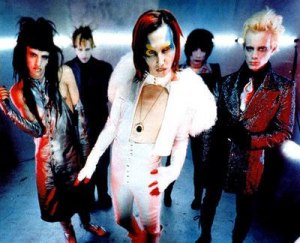I’ve spent the past month in a state of dishonest research. The publishing company 33 1/3 has declared they’re open to proposal submissions. With a late July deadline, I contemplated the albums that have had the largest impact on my life. Marilyn Manson came to mind, as I’m a fan, and from there I considered my favorite albums. With Holy Wood addressing the topic of social violence, I was drawn toward the exploration of that album, but 33 1/3 released a poll of albums that fans of the series wanted to read, and Antichrist Superstar was the only Manson album on the list. Without shame I shifted my focus to what most Manson fans consider to be the greatest critical work of the band. While I am of the opinion that the triptych (Antichrist Superstar, Mechanical Animals, and Holy Wood) is the best work, Antichrist is my least favorite of that collection. But I took the suggestion of the poll, and started collecting notes and ideas that I could construct into a proposal, and then into a 30,000 word project.
Picking up Manson’s autobiography, The Long Hard Road Out of Hell (co-written with Neil Strauss), I read through it for the first time in over a decade, because I remembered the final third of the book covers the production of Antichrist Superstar. Manson claims a good bit of the lyrical content came from dreams. Imagery such as, “Their jaws had been wired shut so that they wouldn’t bite” (215), was dropped into the song, Little Horn. The second single, Tourniquet is also composed of this nightmare imagery, “taking my own hair and teeth… ritualistically creating an artificial companion” (215) reflects the theory that the greatest attribute a man desires in a woman is his own reflection. Such was described in Renaissance depictions of a ‘good wife’ and the notion remains in contemporary criticism, as Tania Modleski states the same concerning her psychoanalytic interpretation Hitchcock films.
Four months into the production and cocaine is the excuse concerning lack of progress on the album. He tells of stagnant sessions leading to drug use, and being so wired from the drugs that progress became out of reach. It’s a troubling read, as Manson describes, “the only time anyone agreed with me was when I suggested we call (the cocaine dealer)” (227). The lowest moment comes with the realization that Manson, “was a rock and roll cliché” (235). The drugs would compromise the project to the edge of failure before any sort of rebound would set the pace for progress.
Before the ball is rolling Daisy Berkowitz (guitarist and last founding member aside from Manson) quits the band, Dave Ogilvie (a producer hired by Trent Reznor to assist on the project) is fired, and David Lynch gives film work to Reznor that Manson expects for himself. Ego based divisions dominates the narrative, and complicates the notion that this album could be possible at all. Oglivie is replaced by Sean Beavan, Twiggy Ramirez (bassist) takes on the majority of the guitar work, Manson claims to quit cocaine (for the moment), and from there the process is hardly written about as the focus of book centers on the chaos, neglecting what brought the production to life.
So I played with the idea of writing essays concerning the album (production, arrangement, lyrics, meaning, critical response, social response, etc.) or even a fictitious exploration of the story that carries this concept album. With the consideration that fans are still waiting for Manson to release his own novel based on Holy Wood, I knew that Antichrist Superstar would be the better fit for a fictional interpretation.
But the notes compiled, and I felt no closer to deciding which route to take. No more comfortable with the project, in spite of the enthusiasm I’ve carried since 33 1/3 announced they’re accepting proposals. Having a degree in music and now majoring in English writing about music feels like a given, but the anger and rage of Antichrist Superstar is not what’s in my heart at the moment.
It took the entire month before I decided to abandon the project. My favorite album by Marilyn Manson is Mechanical Animals, the glam rock concept album with a sleek production that differs from anything else the band has released. The theme of being numb complicated by a first experience with emotion, coupled with the unique sound of the record offers a calm and collected emptiness that would rather go with the apathetic flow than destroy the world.
With this in mind, I know that any proposal I could throw together by the deadline wouldn’t be of enough quality to be worth a contract, but I now know that I want to write about Mechanical Animals. I still plan to write out a solid proposal, but if it’s not ready in time, I’m more than happy to polish and perfect what it is I want to say, and wait for the next open call for submissions.
